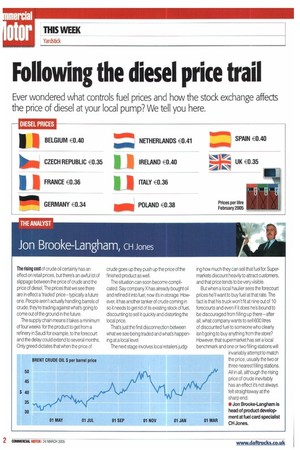Jon Brooke - Langham, CH Jones The rising cast of crude oil
Page 22

If you've noticed an error in this article please click here to report it so we can fix it.
certainly has an effect on retail prices, but there's an awful lot of slippage between the price of crude and the price of diesel. The prices that we see there are in effect a 'traded price —typically a future one. People aren't actually handling barrels of crude; they're trading against what's going to come out of the ground in the future.
The supply chain means it takes a minimum of four weeks for the product to get from a refinery in Saudi for example, to the forecourt and the delay could extend to several months. Only greed dictates that when the price of crude goes up they push up the price of the finished product as well.
The situation can soon become complicated. Say company X has already bought oil and refined it into fuel; now it's in storage. However, it has another tanker of crude coming in so it needs to get rid of its existing stock of fuel, discounting to sell it quickly and distorting the local price.
That's just the first disconnection between what we see being traded and what's happening at a local level.
The next stage involves local retailers judg ing how much they can sell that fuel tor. Supermarkets discount heavily to attract customers, and that price tends to be very visible, But when a local haulier sees the forecourt prices he'll want to buy fuel at that rate. The fact is that his truck won't fit at nine out of 10 forecourts and even if it does he's bound to be discouraged from filling up there —after all, what company wants to sell 600 litres of discounted fuel to someone who clearly isn't going to buy anything from the store? However, that supermarket has set a local benchmark and one or two filling stations will invariably attempt to match the price, usually the two or three nearest f riling stations. All in all, although the rising price of crude inevitably has an effect it's not always felt straightaway at the sharp end.
• Jon Brooke-Lang ham is head of product development at fuel card specialist CH Jones.










































































































































































































